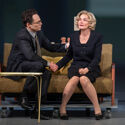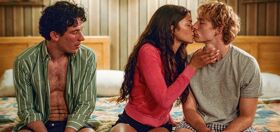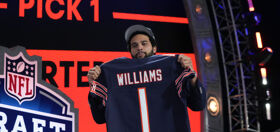There’s a scene in Looking: The Movie in which Patrick, the show’s charmingly milquetoast protagonist, confronts his former lover Richie’s current boyfriend about his ceaseless criticism of other gay guys. It happens toward the very end of the film, which wraps up the loose ends leftover when HBO canceled the series at the end of its second season: Patrick (Jonathan Groff) has just given a toast at a gay couple’s wedding reception at a gay bar. Brady, a journalist, makes no secret of his disapproval. He’s openly hostile to the idea of gay men buying into such a heteronormative institution, and throughout Patrick’s speech there are shots of Brady rolling his eyes.
“I want to get super drunk so I can forget about how dull we’ve all become,” he announces with cartoonish disdain later, echoing one of the biggest complaints about Looking. Already pretty sauced, he gets belligerent, accusing Patrick of being femme-phobic, calling him a shitty gay, and reminding him of the fact that he thought Patrick and his ex Kevin (Russell Tovey) were “everything that’s wrong with the gay community.” The fight escalates from there the way you’d expect a fight between two drunk gay dudes would when there’s more brewing under the surface than what either of them are actually saying.
It’s essentially the film’s climax, the moment when Patrick finally stands up for himself, and the catalyst for the show’s happy ending. It also plays as creators Andrew Haigh and Michael Lannan’s final reckoning with their critics, and as such it feels like the entire series’ final flameout. More than just a defense of the show’s anodyne gay-next-door characters, this confrontation feels a bit like a fuck-you to a perspective that resists the respectable, gender-normative, “post-gay” image of LGBT people promoted by organizations like the affluent-white-male-dominated Human Rights Campaign. As Looking’s most obvious embodiment of that resistance, that discomfort, Brady takes the brunt of what feels like Haigh and Lannan’s backlash in this finale. He, as a character, and we as an audience, deserve better than this.
Since he was introduced in Season 2, Brady (Chris Perfetti) has always played a bit of a duel role. On the one hand he was one of many complications that kept Patrick and Richie (Raúl Castillo) apart. But he was also an aggressive and occasionally abrasive mouthpiece for a particular queer perspective on certain queer issues. “If there’s a pill that prevents HIV, everyone should take it,” he insists during a Season 2 conversation about the controversy surrounding PrEP. “In the same way that birth control liberates women, PrEP can liberate gay men.”
How about we take this to the next level?
Our newsletter is like a refreshing cocktail (or mocktail) of LGBTQ+ entertainment and pop culture, served up with a side of eye-candy.
As a character, Brady could be strident, and his certainty about his views put him at odds with Patrick, whose general uncertainty reflected Looking’s languorous atmosphere. But the show undercut that certainty by making Brady kind of a sloppy drunk. “I’m gonna take back all the shit I said about you guys,” he tells Patrick and Kevin in a later episode after getting wasted at a party. That shit includes the bit about the couple representing everything that’s wrong with the gay community. It isn’t made clear what Brady’s problem with Patrick and Kevin was — beyond the vague sense that it probably had something to do with Patrick’s history with Richie — and I think that ambiguity may have something to do with the fact that Looking’s creators never quite grasped what their critics found objectionable about the show.
“Brady thinks there’s only one way to be gay and that way is his way,” Patrick tells the group in the midst of that final fight scene in the movie. That Haigh and Lannan could include that line considering that their show was only ever concerned with a very specific type of gay guy is pretty ironic. It’s a gross oversimplification of many gay critics’ ambivalence about the series. Slate editor J. Bryan Lowder may have put it best in his review of the show’s first season: “[Looking] may represent the greatest victory to date of those who strive not for the tolerance of queerness in straight society, but for its gradual erasure as we all slide toward some bland cultural mean. Beneath the modern platitudes like love whoever you want and all families are beautiful, there’s a quiet, insidious demand that you blend in as quickly as possible. Don’t harp on the struggles of coming out beyond gay meccas, don’t complain about rampant homophobia and increasing gender policing, don’t lament the ongoing health crisis in your community—that stuff is too old-fashioned, too dramatic. Because some gay people can get married now, we’re past all that.” It’s as if Haigh and Lannan heard these kinds of criticisms and took them as an attack on the sort of “boring” gay men their characters represented.
Of course, it’s more complicated than that. Looking suffered in part from being one of the only shows about gay men on television. It was burdened with the systemic underrepresentation of queer lives on screen. It’s unfair to expect one gay show to be all gay things for all gay people, and there’s nothing wrong with specificity in storytelling. Lannan and Haigh did their best to tell an emotionally authentic, affecting story from the perspective of a particular sort of gay man. Whether or not that made for TV that people actually wanted to watch, it’s still commendable.
But I can’t help but think that Looking would have been a better show if they had done more with Brady than make him a scapegoat for their seeming frustration and resentment of their critics. Certainly it could have been less boring if Lannan and Haigh had allowed him to push back against Patrick’s (often less-than-credible) naivety, his rosy, romantic view of monogamy, his wholesale disengagement from queer politics.
No one is saying that gay men like Patrick shouldn’t be represented on TV — except maybe for Patrick himself in his hyperbolic attack against Brady. But we need characters like Brady to push back against Patrick and Dom and Augusin’s live-and-let-live complacency, especially after North Carolina’s HB2, and the “religious freedom” laws that are enshrining LGBT discrimination across the country; especially after the massacre in Orlando, and in light of the Republican party’s mind-bogglingly homophobic party platform and the fact that without comprehensive nondiscrimination legislation it remains legal to deny LGBT people employment and housing across the country. We need a character like Brady to bring these issues up without being dismissed as a drunk hothead.
“I love it when gays argue with other gays about being gay,” straight BFF Doris (Lauren Weedman) quips, dismissing Patrick and Brady’s final confrontation with the maddening combination of clarity and cluelessness that only an outsider’s perspective can bring to a conversation like this one. She’s right; it’s a crazy conversation to have, as are most conversations about identity politics. But it’s a conversation the gay community, such as it is, needs to have. And it’s one that needs to be taken more seriously than the makers of Looking seem willing to.

























martinbakman
At Outfest, there were spontaneous applause at Doris’ clever quip about gays arguing about other gays.
For critics to assume the creators were using that line to return fire is a bit grandiose, don’t you think? The line is more globally applicable to how poorly we treat each other sometimes, like the way bitter Brad behaved.
But my mind went immediately to Russell Tovey as the origin for that line. The creators are far too talented and dedicated to their craft to cheapen their effort by responding to critic’s opinion. Instead they were much more likely using it as a show of solidarity for one of the Looking family, someone they knew and cared about. Back then, Frankenstein’s mob had already come with torches and gay pitch forks for Tovey due to his comment about avoiding the swishy, gay art school construct. That must have been quite an unpleasant time for him, so it would not surprise me if the line was aimed in support of one of their own.
assiandude
I agree with the author, the Brady character represented a voice that is valid concerning LGBT culture, but I think the series and movie was an actual attack on this concept. Patrick, who just fulfills some type of checklist, white, attractive, good job, charm, but has so little depth of self insight and character that he breaks up two relationships, leaves his friends so that he can “find” himself and comes back with little evidence of growth. I suppose standing up to Brady, not running back into Kevin’s arms, and acting on his his love for a non-white person of a different class and education is his breakthrough. I think what I view as insidious, is that they used Brady’s character as the one who will get hurt and in order to preserve the likeability of Patrick, they have to make him boorish and unsympathetic to the point that it’s ok that Patrick comes in and ruin yet another relationship. Augusin’s character was the closest to having traits that are more classically queer, but this was a negative and stemmed from unhappiness and drug abuse. The message is that we should rather mindlessly follow the heteronormative trend to reach fulfillment and happiness. That’s pretty much what every character did for its happy ending. It’s fine to have a statement that no-one should define what it is to be gay, but the message is that gays who achieve a happiness are those that follow a certain path well forged by the heterosexual community.
Xtian99
“But I can’t help but think that Looking would have been a better show if they had done more with Brady than make him a scapegoat for their seeming frustration and resentment of their critics” – Granted – I loathed the Brady character…. but i think the point of the character is… there is nothing more to do with a one note loser like Brady. They are sooooo boringly self-righteous and inevitably end up drinking or drugging to self-medicate – just as Brady did – not because they suffer this great disdain or ennui with the gay community, or because they have this deep understanding of all our inner demons and flaws… that’s just a cover. They opt out of the gay community themselves bc they know they cannot opt in. They criticize and find fault with a community that they know they are second class citizens in.. and true to form his fears come true – he’s a loud ugly whiny bitter drunk whose way-to-good-for-him BF finally sees him for that and leaves him for someone better- that is the fear that drives the Brady’s of the world. I loved with when Richie said to Patrick “I’ve spent a year of my lifer with someone [Brady] I don’t even love”- I was like “I know! – who could love that!”
redcarpet30
I was glad to see the pretentious prick impload. His type, the kind who think its their mission in life to bitch moan and complain as though theirs is the most important of issues and anyone who is not lapping up their queer theory word vomit is “problematic”, needed to be taken down. Who the fuck goes to a wedding reception and COMPLAINS PUBLICLY ABOUT MARRIAGE?! Other than an insufferable attention whore.
etseq
So unless you are against monogamy, gender non-conforming, anti-marriage and embrace the silly political orthodoxy of a certain brand of college age anti-capitalist utopianism that seems to flourish in San Francisco, then you won’t be politically motivated to fight against right wing backlash du jour? I would argue the opposite – the anti-marriage “queers” have very little interest in doing the hard work of real world organizing and activism and focus all of their “critiques” on attacking the mainstream gay rights movement – the one responsible for all the political, judicial and legislative changes over the last few decades while “queers” wrote journal articles and published blogs ranting about “homonormativity” and “neo-liberalism” or were too busy with sex clubs, bdsm parties, or IML to even think about politics. For all the bitching and moaning about gay marriage being “heteronormative” – which is a terribly reductive essentialist assertion that gays are or should reject long term relationships, raising children, or anything that straight people might do and sounds eerily like the worst smears from the religious right and romanticizes the social location of structural oppression – it has been a remarkably effective grass roots movement that was strongly opposed by HRC and other national groups for many years. If anyone has a narrow view of gay identity and is engaged in public shaming those who differ, its the queers….
jasentylar
I find it hilarious that the author thinks Brady was made to look less credible than the others. Patrick and crew were a hot mess. That’s what the show was about. It’s fiction. Either you love it or you don’t. I loved it. Move on, people!
drelocks15
@assiandude: Damn! You sir get mad props for that post.
inbama
@etseq: Good analysis.
robho3
Who in the hell cares. And why would they make a movie about a show that was canceled because no one watched it- kinda a waste of money in my opinion.
justgeo
I enjoyed the series a bit more than the movie-I agree it was very Whitebread gay.
Even with that the whole movie was so slow and to me limp (dicked) I mostly cared about who wasn’t given much screen time. it was slow slow slow .
DCguy
Ahhhh, the shrill voice of the boring kid so desperate to seem edgy.
As for the author’s comment ” It’s unfair to expect one gay show to be all gay things for all gay people, and there’s nothing wrong with specificity in storytelling. Lannan and Haigh did their best to tell an emotionally authentic, affecting story from the perspective of a particular sort of gay man.”
—–
Nobody expected that from Looking. All we expected were storylines that were watchable and actors who didn’t play their roles like they were children.
The movie was 10 times better than the series because somebody finally gave Groff a note to act like somebody over the age of 18, and the storyline actually held together for more than 5 minutes.